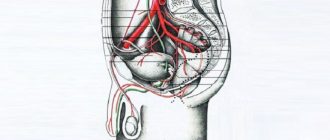Alcohol for prostatitis is prohibited in almost all situations. Ethyl alcohol has multiple negative effects on the prostate gland and is one of the factors causing inflammation, and in case of an existing disease it can cause complications.
The exception is the period of remission of a chronic course. In such a case, very limited quantities of wine or cognac may be permitted.
Impact and Consequences
The effect of alcohol on the prostate gland can be one of the causes of prostatitis. It affects the entire body, causing many negative effects:
- worsens the condition of blood vessels, causing spasms and blood clots;
- inhibits the functioning of the hormonal and immune systems;
- disrupts the functioning of the nervous system.
With spasms and blood clots in the vessels, blood circulation worsens. This causes stagnant processes, which lead to inflammation of the organ.
Alcohol affects the prostate gland and changes hormonal levels. Its use inhibits the production of testosterone, instead of which the production of protein increases. This leads to prostate hypertrophy and benign hyperplasia (adenoma). In the future, this process leads to a malignant neoplasm, i.e. cancer. In addition, reduced testosterone production negatively affects erectile function.
Suppression of the immune system worsens the fight against pathogenic microflora. Therefore, there is an increased likelihood that bacteria that normally live in the genitourinary system and digestive organs will enter the prostate and cause inflammation.
To understand how negatively alcohol affects the prostate, it is worth knowing one statistical fact - with systematic drinking at a young age, the likelihood of developing the disease by the age of 50 increases by 30% (and is 80%).
Alcohol not only provokes the occurrence of pathology, but can also aggravate an existing disease, so drinking alcohol with prostatitis is prohibited.
If you drink alcohol when treating prostatitis, it will cause the following consequences:
- Neutralization of the positive effect of drug therapy.
- Worsening of the symptoms of the disease.
- The likelihood of complications increases.
- A relapse of a previously treated disease is possible.
- Deterioration of sexual functions, which can lead to infertility.
If you have inflammation of the prostate, you should not drink alcohol, primarily because of its interaction with medications - their absorption is impaired. The therapeutic effect is weakened (applies to all groups of drugs), there is a possibility of intolerance or signs of intoxication (when taken with anti-inflammatory drugs), and a sharp drop in pressure is possible (when taken with diuretics).
You can often notice that after drinking alcohol, your prostate hurts the next day, and urination is more difficult than usual. This indicates that the disease is progressing.
There are interesting statistics about what will happen if you drink alcohol with prostatitis:
- the risk of complications increases almost 2 times;
- exacerbation occurs 5 times more often;
- with complete failure, recovery occurs 3 times faster.
When and what drinks are permissible to drink?
In the acute phase, alcohol consumption should be completely avoided, but in chronic prostatitis, alcohol can be consumed once a month in small portions. The same applies to the period of remission, although it makes sense to abstain and completely cure the disease. And yet, before using it, you should consult with your treating urologist and get his approval.
In addition, it is worth considering that not all drinks act in the same way.
Strong alcohol
Drinking vodka for prostatitis is strictly prohibited, like most strong alcohol. With a high concentration of alcohol, a sharper intoxication occurs, which more disrupts the functioning of the immune and hormonal systems. In addition, strong alcoholic drinks have a stronger effect on the functioning of the cardiovascular system. In the first few minutes after entering the blood, alcohol provokes vasodilation (which has a positive effect), but then a sharp vasospasm occurs and patency is impaired. This provokes stagnation of blood in the pelvic organs, due to which they receive less oxygen and nutrients, so the local immune system is also suppressed.
However, cognac for prostatitis in limited doses can have a positive effect. This is only relevant during remission of the disease or chronic non-bacterial inflammation. The allowed amount is considered to be about 50 ml and no more than once a week.
Wine
It is believed that dry red wine can be consumed for prostatitis; it can have a positive effect. This is only partly true because the negative effects of drinking alcohol do not disappear. However, for chronic prostatitis, wine can have a positive effect:
- strengthen blood vessels;
- increase the amount of antioxidants;
- stimulate the immune system.
This is only true for high quality dry red wines. Semi-sweet and other varieties, as well as white wine, have only a negative effect. Drinks made at home also do not fit the definition of high-quality.
You are allowed to drink about 40 ml per day.
Beer
Drinking beer with chronic prostatitis is prohibited, but not because of the large amount of ethyl alcohol and the effect it has. Beer hops contain a substance similar to the female hormone estrogen. It inhibits a man’s normal hormonal levels, impairing testosterone production.
Non-alcoholic beer has a similar effect for prostatitis, moreover, it still contains alcohol in a concentration of 0.5%.



